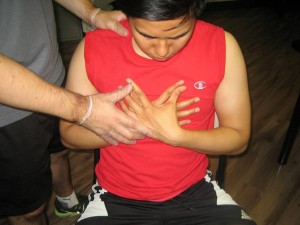Heart rhythm problems or heart arrhythmias happens when the electrical impulses that function in coordinating with the heart beats does not function properly which causes the heart to beat too fast, slow and irregular. Heart arrhythmias are sensations like quivering or racing heart and can be harmless. You can learn more about this condition by enrolling in a course on first aid today.
https://www.youtube.com/watch?v=zOyXvOst7y0
Symptoms of heart arrhythmia
- A fast heartbeat or tachycardia
- A quivering in the chest
- A slow heartbeat or bradycardia
- There is shortness of breath and chest pain
- Dizziness, light-headedness and fainting or syncope or near fainting

Causes of arrhythmia
- Blocked arteries found in the heart or coronary artery disease
- High blood pressure and diabetes
- Overactive thyroid gland or hyperthyroidism and an underactive thyroid gland or hypothyroidism
- A heart attack that is happening right now and scarring of heart tissue from a previous heart attack
- Drug abuse and stress
- Drinking alcohol and caffeine
- Certain medications and changes in the heart structure like cardiomyopathy
- Some dietary supplements and herbal treatments
- Pollutions in the air and electrical shock
There some types of arrhythmias like the tachycardia which is a fast heartbeat in which at rest, the heart rate is greater the 100 beats per minute. The other one is bradycardia is referred to a slow heartbeat in which the heart rate is less than 60 beats per minute at rest.
Some complications that can be caused by arrhythmias include stroke and when the heart spasms since it cannot pump blood effectively and will cause blood clots to form. If a clot will break, it can spread from the heart to the brain and it causes blockage of the flow of blood, resulting to a stroke. Another is heart failure which occurs when the heart is pumping ineffectively for long period of time caused by bradycardia or tachycardia like atrial fibrillation.
Treatment and home remedies
- Eat food that is low in salt content and solid fats, fruits, vegetables and whole grains.
- Do some regular exercises every day and increase physical activities
- Minimize smoking and maintain a healthy weight and avoid being overweight since it increases the risk of developing heart diseases.
- Maintain blood pressure and cholesterol level in control by taking medications that are prescribed to correct high blood pressure or hypertension or high cholesterol.
- Minimize drinking of alcohol
- Maintain follow-up appointments with the doctor.
Prevention of arrhythmias
In order to prevent heart arrhythmia, live a heart-healthy lifestyle in order to minimize of risk of heart diseases. This is done by increasing physical activities; eat a heart-healthy diet which includes foods low in salt content and solid fats, fruits, vegetables and some whole grains.
Avoid being overweight, smoking and minimizing the use of caffeine and alcohol. Minimize being stressed out since it can cause heart rhythm problems and minimizing the use of over-the-counter medications for cough and colds since it contains stimulants that can start a rapid heartbeat.